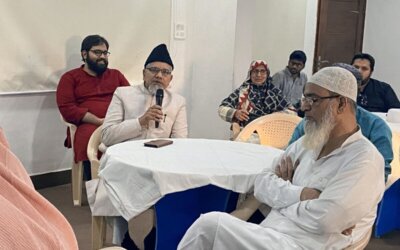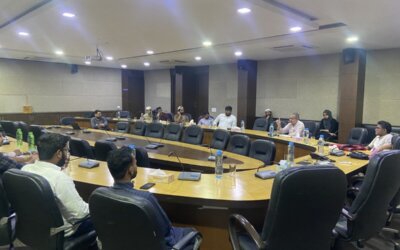Students Islamic Organisation of India organized three-days “National Policy Explanation Camp” for State leaders of SIO, on 26th- 28th January 2013 at Nagpur (Maharashtra). The program formally started with the inaugural words by Sarwar Hasan, General Secretary SIO of India. A thematic presentation on the topic “The Changing Socio-Political Scenario of India and Role of JIH-SIO” by Sadatullah Husaini, the Central Advisory Council member of Jamat-e-Islami Hind. He also delivered an important lecture the same day, addressing “Ideological Soundness and Intellectual Hegemony – Need of the Hour”.
A thematic presentation on the topic “The Changing Socio-Political Scenario of India and Role of JIH-SIO” by Sadatullah Husaini, the Central Advisory Council member of Jamat-e-Islami Hind. He also delivered an important lecture the same day, addressing “Ideological Soundness and Intellectual Hegemony – Need of the Hour”.
The Second day’s talk centered on the topic “Dawah – With Reference to Indian Campuses and Society” by former President SIO of India, Suhail K.K. and his pressing focus on “Terrorism – Myth and Reality”. Brother Ziyaul Islam, Asst. webmaster, delivered a thematic presentation on Web activism.
The detailed explanation of the Policy Program for the current term as discussed and designed by the Organization’s Central Advisory Council (CAC) was given by the National Secretaries Limsir Ali, Sharique Ansar, Arshad Hussain and Masiuzzaman , followed by State Representative Leaders from across the length and breadth of the country bringing aspects of vision and planning from the concerned states to spotlight. The list of Zonal Presidents included Abu Tahir (Tamil Nadu), Tauseef Ahmed (Karnataka), Mozammil Ismail (UP-East), Najmus Saquib (UP-Central), Israfil Hussain (Assam North), Mutallib Mirza (Rajasthan), Mohammed Anwar (Bihar), Anis Rahman (Delhi) and Kamranullah Khan (JMI). The president of the Organization brother Ashfaq Ahmed summed the session with his kind words.
Emphasizing the organizational approach, the unambiguous message from the National President SIO of India, Ashfaq Ahmed in the conclusive assembly was: “We have to create an everlasting impact on the society by our ideology, approach and message; we have to speed up the process of bringing SIO in the mainstream of the society by addressing student issues and engaging ourselves with the larger part of the society.”
National Policy Explanation Camp Held at Nagpur





0 Comments